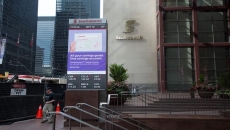The full impact of sweeping economic lockdowns meant to slow the spread of COVID-19 came into sharper view, with new figures showing Canada saw the largest monthly drop on record in April as the country came to a near standstill.
Statistics Canada said Tuesday that gross domestic product fell 11.6 per cent in April with non-essential businesses shut for the full month following a 7.5 per cent decline in March.
Economists on average expected a drop of 13 per cent for April, according to financial markets data firm Refinitiv.
Even though the April figures fell short of expectations, they showed the unprecedented drop the country experienced in such a short time.
Nathan Janzen, a senior economist with RBC, said the decline over April and March was four times worse than the peak-to-trough fall during the global financial crisis just over a decade ago — and that took eight months.
But early indications point to a rebound in May when businesses began to reopen.
Statistics Canada said its initial flash estimate points to growth of three per cent in May, mirroring a small increase in jobs numbers during the same month. The estimate will be revised and finalized at the end of July.
Other preliminary indicators suggest June may be even better.
The Conference Board of Canada reported Monday that its consumer confidence index improved across all regions this month. The Canadian Federation of Independent Business said Tuesday nearly three-fifths of small businesses are fully open, almost one-quarter are making normal sales, and just over one-third are back to normal staffing levels.
"It's not that the bounce back is going to be complete any time quickly, but it does look like the recovery began in May," Janzen said in an interview.
"The key concern now is still just how much and how quickly can the economy reopen while still keeping virus spread in check. That's still an open question, but at least for now it looks like April was the low-point in terms of economic output."
Manufacturing was down 22.5 per cent in April as many factories either shuttered or greatly reduced capacity in line with public health measures to slow the spread of COVID-19 — a move that hit the automotive sector hard as the output of motor vehicles plunged 97.7 per cent.
Even sectors with March increases weren't spared in April. Food manufacturing, for example, dropped 12.8 per cent as outbreaks at meat processing plants forced them to shut down.
The accommodation and food services sector dropped 42.4 per cent in April, as customers replaced eating out with staying in, hitting a sector that underwent a 37.1 per cent decline in March.
Output from bars and restaurants in particular plunged 40.8 per cent as local and provincial states of emergency forced their closure, or limited operations to take-out and delivery.
Accommodation services fell 45.7 per cent, Statistics Canada says, owing to restrictions on travel between provincial and international borders.
And then there was sports.
As COVID-19 iced the National Hockey League season and put the National Basketball Association, Major League Baseball and Major League Soccer on the sidelines, the arts and entertainment sector declined 25.6 per cent, further affecting companies in the accommodation and food services sectors.
Down too was construction by 22.9 per cent, concentrated largely in Ontario and Quebec, while a similar decline was noted in retail trade as brick-and-mortar stores stayed closed and consumers spent less while staying at home.
Poring through the data, Statistics Canada noted a jump in output of 17.3 per cent from online shopping as households shifted their shopping habits.
The economic report overall provides a more complete picture of the "fearsome economic impact" of widespread shutdowns, BMO chief economist Douglas Porter wrote in a note.
The flash estimate for May is rough half of what was expected, CIBC chief economist Avery Shenfeld wrote in a separate analysis.
A sharp rebound is likely in the near term, but beyond that "repairing the rest of the March and April wreckage will be a slower process," Shenfeld wrote, "as recent COVID-19 flare ups here and elsewhere are showing the hazards of moving too far ahead of the virus."


.jpg)



